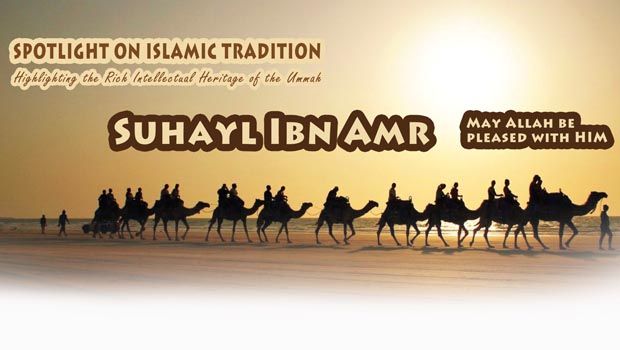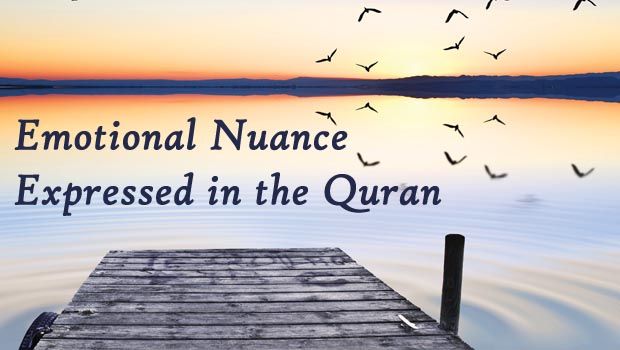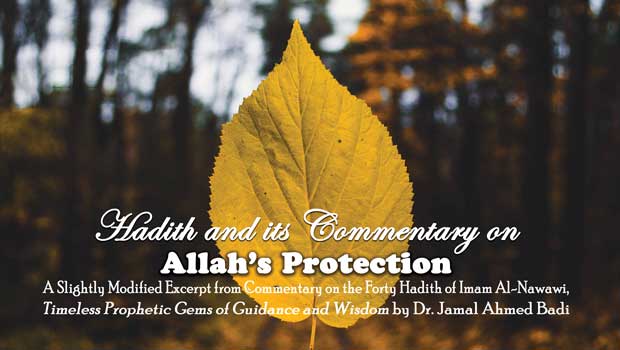At the Battle of Badr, when Suhayl Ibn Amr, a prominent person among the Quraysh, fell into the hands of the Muslims as a prisoner, Umar ibn al-Khattab went to the Prophet and said, “Messenger of God! Let me pull out the two middle incisors of Suhayl ibn Amr so that he would not be able to stand up and speak out against you after this day.” The Prophet (peace be upon him) replied, “Certainly not, Umar,” adding, “I would not mutilate anyone lest God mutilate me, even though I am a Prophet.” And calling Umar closer to him, the blessed Prophet said, Umar, perhaps Suhayl will do something in the future which will please you.”ibn Amr was clever and articulate, and his opinion carried weight among his people. He was known as the spokesman and orator of the Quraysh.
Towards the end of the sixth year after the Hijrah, the Prophet and about fifteen hundred of his sahabah (companions) lef Madinah for Makkah to perform Umrah. To make it known that they were coming in peace, the Muslims were not armed for battle and carried only their travelers’swords. They also took with them animals for sacrifice to let it be known that they were really coming on pilgrimage. The Quraysh found out that they were approaching and immediately prepared to do battle with them. They vowed that they would never allow the Muslims to enter Makkah. Khalid ibn al-Walid was dispatched at the head of a Quraysh cavalry force to cut off the approaching Muslims. Khalid’s army stood waiting for them at a place called Kara al-Ghamim.
The Prophet learned of the Quraysh intention to engage in battle and where Khalid and his army were positioned. The Prophet was keen not to have any encounter then with the Quraysh forces. He asked, “Is there any man who could take us on a different route to avoid the Quraysh?” A man from the Aslam tribe said he could, and took the Muslims through the difficult terrain of Warah and then on a fairly easy march, finally approaching Makkah from the south. Khalid realized what the Muslims had done and returned frustrated to Makkah.
The Treaty of Hudaybiyyah.
The Prophet camped near Hudaybiyyah and indicated that if the Quraysh gave any hint of a truce out of veneration for the sacred time and place, he would respond favorably. The Quraysh sent Badil ibn Warqa with a group of men from the Khuzaah tribe to find out why the Muslims had come. Badil me tthe Prophet and when he returned to the Quraysh and informed them of the peaceful intentions of the Prophet and his companions, they did not believe hi mbecause he was from the Khuzaah who were allies of Muhammad. “Does Muhammad intend,” they asked, “to come upon us with his soldiers (in the guise of) performing Umrah? The Arabs would hear that he moved against us and entered Makkah by force while a state of war existed between us. By God this will never happen with our approval.”
The Quraysh then sent Halis ibn Alqamah, the chieftain of the Ahabish who were allies of the Quraysh. When he returned and told the Quraysh that the Muslims wanted only to perform Umrah, they did not believe him either. Urwah ibn Masud, the Thaqafi chieftain from Tail, was then sent out to assess the situation. When he returned to the Quraysh, Urwah showed that he, too, was impressed with the sincere intentions of the Muslims. He said, “By God, O people of the Quraysh, I have been to Chosroes in his kingdom and I have seen Caesar the Byzantine emperor in the plenitude of his power, but never have I seen a king among his people like Muhammad among his companions. I have seen a people who would not abandon him for anything. Reconsider your position. He is presenting you with right guidance. Accept what he has presented to you. I advise you sincerely… I fear that you will never gain victory over him.” “Don’t speak like that,” said the Quraysh. “We will have him go back this year and he can return in the future.” Meanwhile, the Prophet summoned Uthman ibn Affan and sent him to the Quraysh leaders to, once again, inform them of his purpose in coming to Makkah, and to ask their permission for the MusIims to visit their relatives. Uthman was also to cheer up the Muslims who still lived in Makkah and inform them that liberation would not be long in coming. Uthman delivered the Prophet’s message to the Quraysh and they repeated their determination to not allow the Prophet to enter Makkah. They suggested that Uthman could make tawaf around the Kabah but he replied that he would not make tawaf while the Messenger of God was prevented from doing so. They then took Uthman into
custody and a rumor spread that he was killed. When the Prophet heard this, he was determined to fight, until he ascertained that the rumor was false.
It was at this point that the Quraysh sent Suhayl ibn Amr to the Messenger of God to negotiate and persuade the Prophet to return to Madinah without entering Makkah. The talks between the Prophet and Suhayl continued until they finally came to an agreement in principle. Umar and others were very upset with the terms of the agreement which they considered to be harmful to the cause of Islam and a defeat for the Muslims. The Prophet assured them that this was not the case and that he would never go against the command of God and that God would not neglect him.
He then called Ali ibn Abi Talib to write down the terms of the treaty. He said, “Write: Bismillahi-r Rahmani-r Rahim.” “I don’t know this (phrase),” interjected Suhayl. “Write instead ‘Bismika Allahumma – In Your name, O Allah.” The Prophet conceded and instructed Ali to write ‘Bismika Allahumma.’ He then said: “Write, ‘This is what haseen agreed between Muhammad the Messenger of God and Suhayl ibn Amr…” Suhayl objected, saying, “If I had testified that you were indeed the Messenger of God, I would not be fighting you. Write instead your name and the name of your father.” So the Prophet again conceded this and instructed Ali to write, “This is what has been agreed upon by Muhammad, the son of Abdullah, and Suhayl ibn Amr. They have agreed to suspend war for ten years in which people will enjoy security and will refrain from (harming) one another. Also, that whoever from among the Quraysh should come to Muhammad without the permission of his wali (legal guardian), Muhammad would send him back to them and that if any who is with Muhammad should come to the Quraysh, they would not send him back to him.”
Suhayl (r) Enters Islam
Suhayl had gotten as much as possible for the Quraysh in the negotiations; it was enough for them to save face. For a couple of years of the Hudaybiyyah treaty, the Muslims enjoyed a respite from the Quraysh and were freed to concentrate on other matters. In the eighth year after the Hijrah, however, the Quraysh broke the terms of the treaty by supporting the Banu Bakr in a bloody aggression against the Khuzaah, allies of the Muslims. The Prophet took the opportunity to march on Makkah but his object was not revenge. Ten thousand Muslims converged on Makkah, reaching there in the month of Ramadan. The Quraysh realized that there was no hope of resisting let alone defeating the Muslim forces. They were completely at the mercy of the Prophet. They had persecuted the Muslims, tortured and boycotted them, driven them out of their homes, and made war on them. What was to be their fate?
The city surrendered to the Prophet. He received the leaders of the Quraysh in a spirit of tolerance and magnanimity. In a voice full of compassion and tenderness he asked, “O people of the Quraysh! What do you think I will do with you?” Thereupon, the adversary of Islam, Suhayl ibn Amr, replied, “We think (you will treat us) well, noble brother, son of a noble brother.” A radiant smile flashed across the lips of the beloved of God as he said, “Go, for you are free.” At this moment of unsurpassed compassion, nobility, and forgiveness, Suhayl ibn Amr (may Allah be pleased with him) was shaken and he announced his submission to Allah through acceptance of Islam. This was not a defeated man passively giving himself up to his fate. It was instead, as the rest of his life was to demonstrate, the acceptance of Islam as a man who was captivated by the greatness of Muhammad and the greatness of the religion. Those who became Muslims on the day Makkah was liberated were given the name “at-tulaqaa” or the free ones. They realized how fortunate they were and many dedicated themselves in sincere worship and sacrifice to the service of the religion which they had resisted for years. Among the most prominent of these was Suhayl ibn Amr. The qualities and practices for which he became known over the years were kindness, generosity, frequent prayer, fasting, and recitation of the Quran. This was the greatness of Suhayl. When the Prophet, may God bless him and grant him peace, passed away, the news quickly reached Makkah, where Suhayl was still resident. The Muslims were plunged into a state of confusion and dismay just as in Madinah. In Madinah, Abu Bakr, may God be pleased with him, quelled the confusion with his decisive words: “Whoever worships Muhammad, Muhammad is dead. And whoever worships Allah, Allah is indeed living and will never die.”
In Makkah, Suhayl performed the same role in comforting the Muslims and speaking the truth about Allah, the Prophet, and Islam. He called the Muslims together and in his brilliant and inspiring style, he affirmed to them that Muhammad was indeed the Messenger of Allah and that he did not die until he had discharged his trust and propagated the message. He also said that it was the duty of all believers after the Prophet’s death to apply themselves with utmost devotion to following his example and way of life. On this day more than others, the prophetic words of the Messenger shone forth. Did not the Prophet say to Umar at Badr, “Perhaps Suhayl will do something in the future which will please you”? Indeed, he not only accepted Islam, he lived the rest of his life as a paragon of true devotion to Allah and His religion. He died in Palestine in the small village of Amawas, near Jerusalem.





